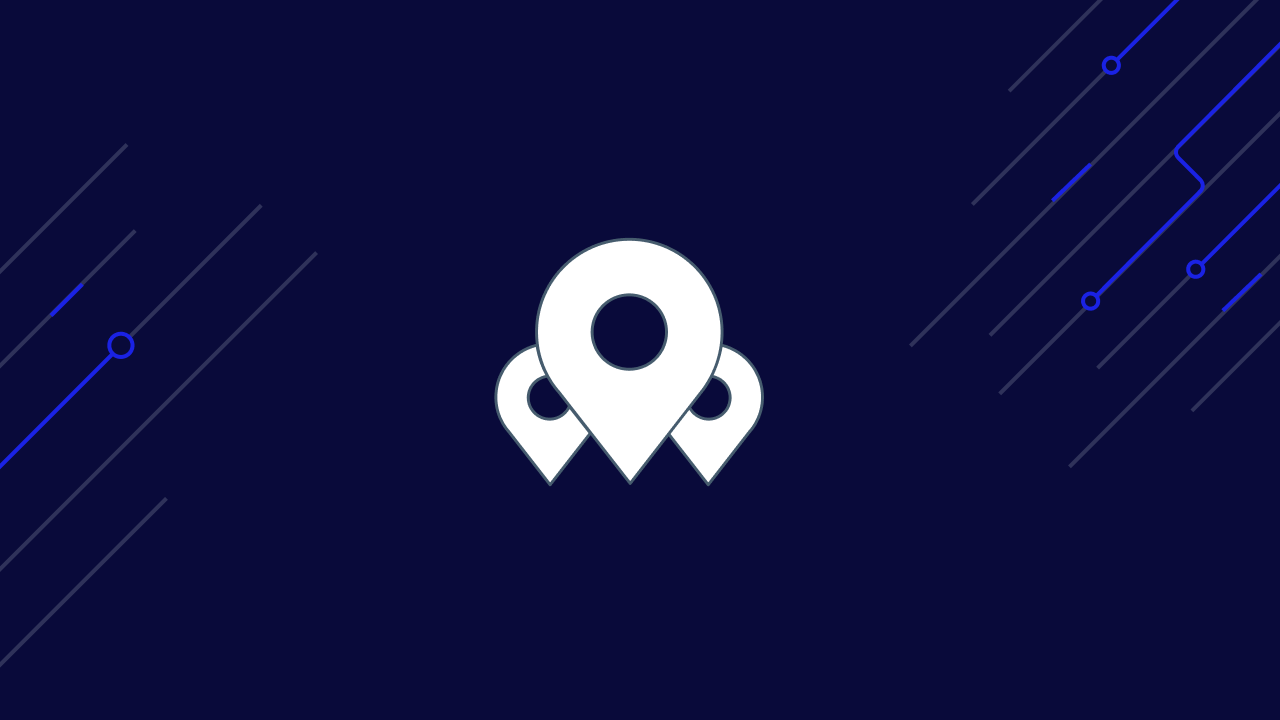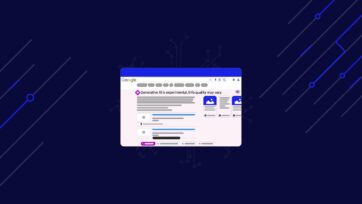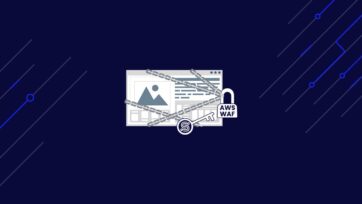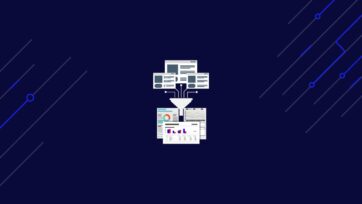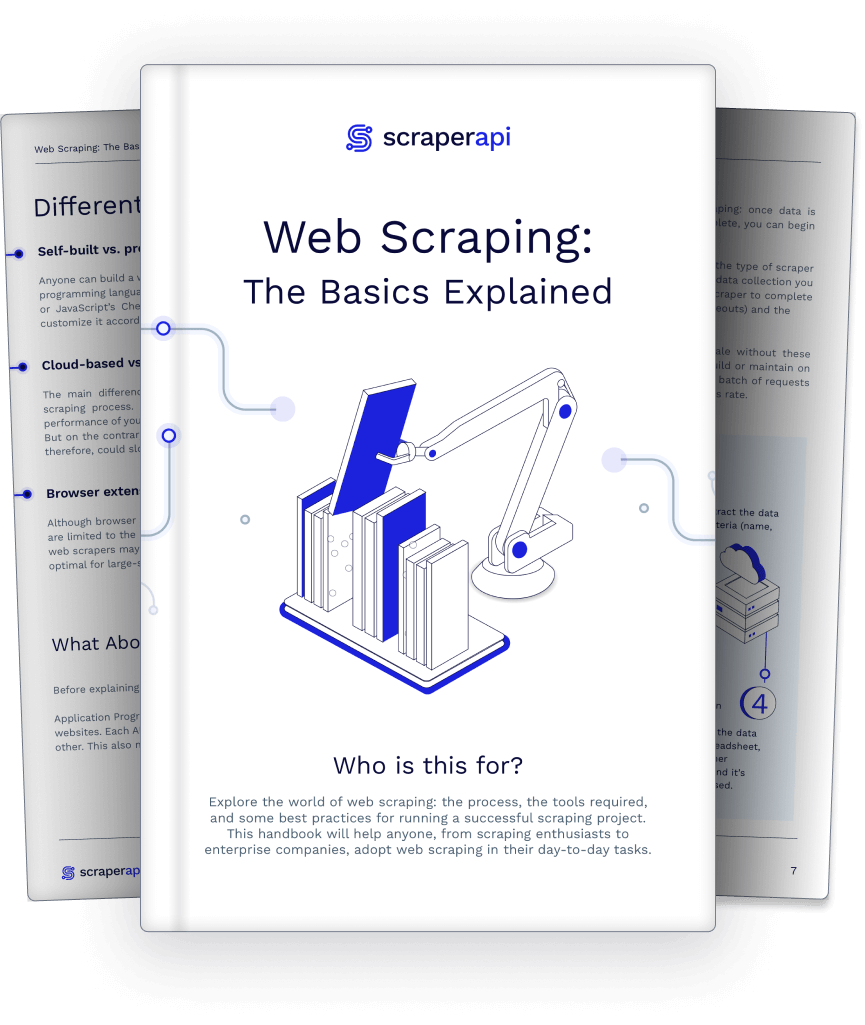What is a Rotating Proxy?
A rotating proxy is a proxy server that automatically rotates your requests amongst a massive IP proxy pool every time the you make a new connection to the proxy server. Using this approach, you don’t need to build and maintain your own proxy rotation infrastructure on your end. Instead, you can just send your requests to the proxy server and it will use a different proxy with every request. Ensuring that you aren’t constantly using the same proxies to make requests to the target website.

Using a rotating proxy like this makes it easier to simulate many different users connecting to an online service or website instead of multiple requests from a single user. Enabling you to bypass even relatively advanced anti-bot systems and still get the successful responses you need to scrape your target data. And even if one IP does get blocked, your next connection request will have a different IP and most likely will be successful.
The rotating proxy technique can be implemented with both dedicated/datacenter proxies as well as residential proxies. Although the latter will be even more effective, using rotating proxies with either will dramatically increase your success rate when running web scraping, or other similar, tools.
If you are looking for a rotating proxy solution then be sure to give ScraperAPI a try by signing up to a free trial with 5,000 free requests. Not only is ScraperAPI a rotating proxy solution that automatically rotates your requests amongst a proxy pool with over 40M proxies, it also automatically uses the best header configuration for your target website and handles all bans and CAPTCHAs thrown by a sites anti-bot system.
Why Should You Use a Rotating Proxy For Web Scraping?
A basic pool of proxies might work for some use cases, however, there are many reasons why you would want to use a rotating proxy for web scraping:
Spread Your Requests Over Thousands of IPs
The biggest advantage of using a rotating proxy solution compared to buying individual proxies is that allows you to easily spread your requests over thousands, if not millions, of proxies so that you can easily scrape a website at scale.
Typically, your rotating proxy provider will give you a single proxy port or API endpoint to send all your requests to and then they their proxy management layer will deal will routing your requests amongst their pool of proxies. So you don’t need to worry about building and configuring the proxy rotation logic.
Bypass Anti-Bot Countermeasures
Today, websites are using numerous anti-bot and CDN solutions that are designed to prevent scrapers from getting access to their sites public information making it much more difficult to get the data you need.
Using a rotating proxy solution like ScraperAPI is great in situations like this, because not only does it manage the proxy rotation but also header selection/rotation and has custom anti-bot bypasses built in as standard that are designed to allow you to scrape that data you need without having to worry about getting banned.
Connect via Multiple Geo-locations at the Same Time
Some rotating proxy services allow you to split your proxy connections across a number of threads. Each thread can be assigned IP addresses from a particular zone or region. This way, you can simultaneously access location-based content from multiple sources.
For example, if you use a proxy service for sneaker cropping, this allows you to connect to online stores in different countries. You could simultaneously scrape sneaker results in the U.S. and the E.U., for example, giving you a much better chance at scoring the perfect deal.
A rotating proxy can continuously swap out addresses for each thread, reducing the chance that you’ll miss requests thanks to anti-botting or scraping solutions.
Request Throttling
Mainly large sites like Google or Amazon have implement their own custom anti-bot countermeasures that effectively cap the number of requests you can send to their site from any more IP address in a given time period before being presented with a CAPTCHA page.
In cases like these, it is absolutely essential to use some form of rotating proxy solution as there is no way to scrape a site at scale with without having access to pools of thousands or millions of proxies.
Rotating proxies will maximize the potential for you to get the most complete and accurate data set out of your web scraping attempts. By assigning a new IP to every request, you’ll be able to continuously stay under the radar. Combined with the ability to geo-spread connection threads, you can also get this data specifically for any region.
What is a Datacenter Rotating Proxy?
A rotating datacenter proxy is a proxy server that automatically uses a different data center proxy with each request. Whenever you connect to a website via a datacenter proxy, the proxy server assigns an IP address based in a datacenter from its pool of proxies to you. Datacenter IPs are not tied to a specific ISP, but to the organization/entity that owns the data center/proxy pool.
While you as an individual can’t be traced by this IP address, it can’t be traced back to the company/entity that owns the relevant data center. Meaning that it acts as a curtain between you and other services or endpoints on the web.
The downfall of this method is that actors who are serious about banning proxies can identify when a particular IP address comes from a data center proxy pool by tracing its owner. They can then blanket ban IPs originating from these sources. So, while a datacenter rotating proxy will result in more of your requests to slip through countermeasures, it’s by no means fool proof and might be completely blocked on certain sites.
Typical consumer VPNs are one example of services that provide datacenter proxies. They are mostly suitable for getting around geo-blocked content or when your specific IP has been blacklisted somewhere.
What is a Residential Rotating Proxy?
To understand a residential proxy, we first need to understand exactly what a residential IP is.
An IP address is an address that’s unique to every device connected to the internet. It indicates the owner ISP that assigned it as well as the geolocation of the device.
A residential IP is tied to a specific device and registered to a specific home address. A residential IP, therefore, is a verified IP associated with a real person and device. Residential IPs are still owned by the ISP and assigned to users, but pass a much higher bar of verification than datacenter IPs. They are therefore much more trusted by online services or websites.
Other than that, residential proxies work in much the same way. When using one, you will connect to the internet via an intermediary server that will assign your connection with a new IP address. To third parties, the IP address looks completely legit, and as far as they are concerned is associated with a real individual in the real world.
By extension, a residential rotating proxy also makes use of a large pool of residential IP addresses. With each connection, or on a frequent basis, you are assigned a new residential IP
As you may expect, these are much harder to obtain than standard datacenter IPs. That’s also why residential IP packages are significantly more expensive than datacenter proxies. That being said, they offer a much higher rate of accuracy and are more efficient at simulating real-world behaviour. It’s incredibly hard to distinguish a single actor using a residential rotating proxy from multiple actors simultaneously connecting to a server.
Rotating Proxies are Worth It?
Whether you want to use the more affordable data center rotating proxies or the pricier residential rotating proxies, it can seem quite expensive, even without creating proxy rotation infrastructure on your own.
However, if you are using a proxy for any serious or ambitious projects, it’s almost irreplaceable. For one, if you’re running a web scraper or any other type of bot, a single IP will quickly get banned before you’ve executed a large number of requests.
When scraping the web, you are often making thousands, if not millions of requests in a short period of time. A few hundred, or even less, requests are already out of the ordinary, so you can get flagged before you’ve even made a dent in your target.
Residential rotating proxies are very expensive but can be worth their cost, particularly if the website is using a very aggressive anti-bot. More and more businesses with an online presence are clamping down on visitors bypassing their geo-blocking and anti-botting tools using standard VPNs or data center proxies.
Some, or all, of the IPs listed in the pool, might be known to the anti-botting solution, which could seriously impact your scraping tool’s effectiveness.
Using free proxy services are not recommended as they have a bad track record of abusing, or even selling user data, including financial information and website logins.
How to Use a Rotating Proxy?
The easiest way to use a rotating proxy is to sign up with a rotating proxy service like ScraperAPI. Most of these services offer rotating proxy packages that implement this functionality automatically. You also usually get a number of other useful features, such as geo-splitting connection threads, JS rendering, etc.
To integrate they give you a proxy port and/or API endpoint to send your requests and then they handle the rest.
Otherwise, you can go the manual route and build your own datacenter proxy list and then write your own proxy rotator. Just be aware that IPs in datacenter proxies tend to be short-lived and you will most likely regularly need to update your list with fresh IPs. Premium proxy services usually have pools with thousands upon thousands of IPs.
Is Using Rotating Proxies Legal?
Yes, in the vast majority of countries using a proxy to request the HTML and data from a site is completely legal. There are no laws that prevent private citizens from owning or using proxy services to make a request to a website using a different IP address than the IP address of their own machine.
However, in some countries where internet censorship is the norm then there are some situations that using a proxy might be illegal under the laws of your particular country if you are using the proxy to get access to a website that your country has banned. In these situations, your government might have banned the use of proxies or they have banned the accessing of a particular site.
Is it Dangerous to Use Proxies When Scraping the Web?
Using a proxy in of itself isn’t dangerous, it is who’s proxies you are using that is dangerous. Some bad actors using proxies as a way to spy on what data you are transmitting or to infect your machine with malware so it is always important to use proxies from high quality proxy providers and never use free proxy lists as they are the most at risk.
Related information about Proxies you might like:
- How to use and rotate proxies in Python
- Best proxies for Amazon web scraping
- Advanced web scraping guides
- Using cURL with proxies: A step-by-step guide
